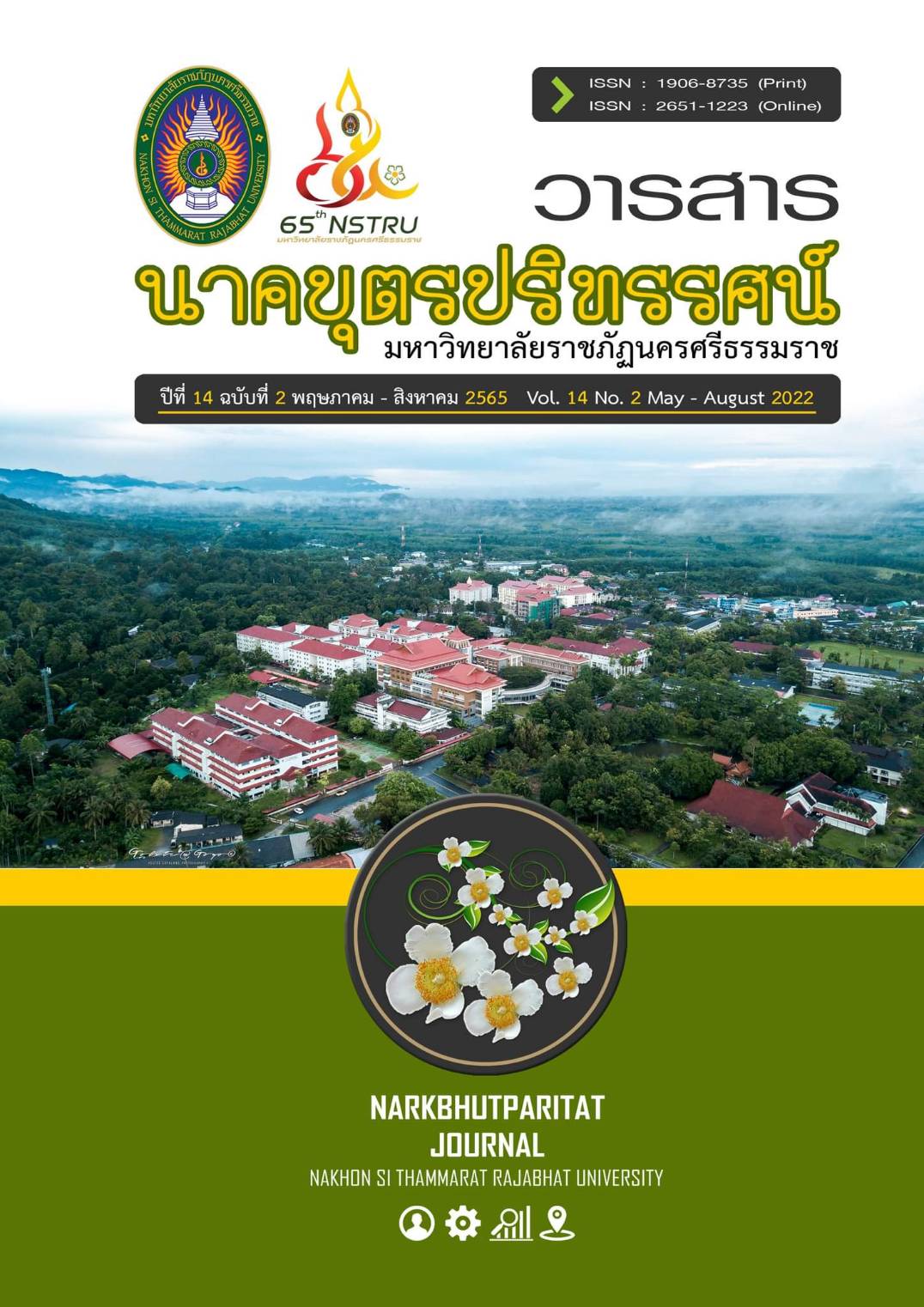การศึกษาผลสัมฤทธิ์ทางการเรียนและความคงทนในการจดจำคำศัพท์ภาษาอังกฤษ ด้วยสื่อเทคโนโลยีความเป็นจริงเสริม ของนักเรียนชั้นมัธยมศึกษาปีที่ 1
Main Article Content
บทคัดย่อ
การเรียนรู้แบบดิจิทัล ผู้เรียนให้ความสนใจและมีอิสระ ในศตวรรษที่ 21 เทคโนโลยีความเป็นจริงเสริมได้ถูกนำไปใช้เป็นสื่อการเรียนรู้ภาษาอังกฤษ มีศักยภาพที่สามารถตอบสนองความอยากรู้อยากเห็นมากขึ้น การวิจัยครั้งนี้มีวัตถุประสงค์เพื่อ 1) พัฒนาสื่อเทคโนโลยีความเป็นจริงเสริมสอนคำศัพท์ภาษาอังกฤษ ของนักเรียนชั้นมัธยมศึกษาปีที่ 1 2) เปรียบเทียบผลสัมฤทธิ์ทางการเรียนของนักเรียนก่อนและหลังการจัดการเรียนรู้โดยใช้สื่อเทคโนโลยีความเป็นจริงเสริมสอนคำศัพท์ภาษาอังกฤษ ของนักเรียนชั้นมัธยมศึกษาปีที่ 1 และ 3) ศึกษาความคงทนในการจดจำคำศัพท์ภาษาอังกฤษ จากการใช้สื่อเทคโนโลยีความเป็นจริงเสริม ของนักเรียนชั้นมัธยมศึกษาปีที่ 1 ประชากร ได้แก่ นักเรียนชั้นมัธยมศึกษาปีที่ 1 โรงเรียนสุราษฎร์พิทยา จำนวน 470 คน กลุ่มตัวอย่างนักเรียนชั้นมัธยมศึกษาปีที่ 1 ปีการศึกษา 2563 ภาคเรียนที่ 2 จำนวน 49 คน ด้วยวิธีสุ่มอย่างง่ายโดยใช้กลุ่มชั้นเรียนเป็นหน่วยในการสุ่ม เครื่องมือที่ใช้ในการวิจัยประกอบด้วย 1) สื่อเทคโนโลยีความเป็นจริงเสริม 2) แผนการจัดการเรียนรู้ 3) แบบทดสอบวัดผลสัมฤทธิ์การเรียน มีค่าความยากง่าย (p) ระหว่าง 0.41-0.79 ค่าอำนาจจำแนก (r) ระหว่าง 0.24-0.88 ค่าความเชื่อมั่นเท่ากับ 0.82 สถิติที่ใช้ได้แก่ ค่าเฉลี่ย ค่าส่วนเบี่ยงเบนมาตรฐาน และทดสอบสมมุติฐานโดยใช้ค่าที (t-test dependent)
ผลการวิจัยพบว่า 1) ประสิทธิภาพของสื่อเทคโนโลยีความเป็นจริงเสริมสอนคำศัพท์ภาษาอังกฤษ ของนักเรียนชั้นมัธยมศึกษาปีที่ 1 มีประสิทธิภาพ เท่ากับ 80.10/81.29 2) ผลสัมฤทธิ์ทางการเรียนของนักเรียนในการจัดการเรียนรู้โดยใช้สื่อเทคโนโลยีความเป็นจริงเสริมสอนคำศัพท์ภาษาอังกฤษ ของนักเรียนชั้นมัธยมศึกษาปีที่ 1 หลังเรียนสูงกว่าก่อนเรียนอย่างมีนัยสำคัญทางสถิติที่ระดับ .01 และ 3) ความคงทนในการจดจำคำศัพท์ของนักเรียนที่ได้รับการจัดการเรียนรู้ โดยใช้สื่อเทคโนโลยีความเป็นจริงเสริมสอนคำศัพท์ภาษาอังกฤษ มีผลสัมฤทธิ์ทางการเรียนหลังเรียนจบไปแล้ว 2 สัปดาห์ มีคะแนนเฉลี่ย เท่ากับ 23.57 จากคะแนนเต็ม 30 คะแนน ไม่ต่ำกว่าร้อยละ 70 สื่อเทคโนโลยีความเป็นจริงเสริมสอนคำศัพท์ภาษาอังกฤษ มีความคงทนในการเรียนรู้ การพัฒนาแอปพลิเคชันที่สามารถโต้ตอบกับผู้เล่นมีเสียงอ่านคำศัพท์ช่วยกระตุ้นการเรียนรู้ของผู้เรียน ดึงดูดความสนใจ ซึ่งเป็นการผลิตนวัตกรรมทางการศึกษาที่มีประสิทธิภาพและเป็นการประยุกต์ใช้สื่อดิจิทัลกับการศึกษาได้อย่างยั่งยืนต่อไป
Article Details

อนุญาตภายใต้เงื่อนไข Creative Commons Attribution-NonCommercial-NoDerivatives 4.0 International License.
เอกสารอ้างอิง
Akcayır, G. (2016). Research trends in social network sites’ educational use: A review of publications in allSSCI journals to 2015. Retrieved 2015, April 9, from https://eric.ed.gov/?id=EJ1116314. (in Thai)
Amanda, W. (2015) Classroom for the Future of Education in Thailand. (Online). Retrieved 2015, January, 6. from: https://blog.eduzones.com/Global academy center/140758.
Amnaj, C. (2012). Application of augmented reality techniques to produce teaching materials for wood structures. (Master of Science Information Technology and Management thesis). Chiang Mai University, Faculty of Information Technology. (in Thai)
Chanya, C. (2016). The development of learning materials for English vocabulary for grade 1 students with augmented reality technology. (Master of Education thesis). Rajabhat Maha Sarakham University, Faculty of Information Technology. (in Thai)
David, W. (1972). Linguistics in language teaching. Cambridge: MIT Press. London.Ghadessy M. (1998). Word Lists and Materials Preparation: A New Approach. English Teachings Forum, 17(1).58-69
Jareonsettasin, T. (2016). Thai Education 4.0 in the Context of Educational Management For sustainable development. Bangkok: Vayupak Convention Center Centra Hotel Government Center and Convention Center Chaengwattana. Retrieved 2020, August 24, from https://gnews.apps.go.th/news?%20news=16801. (in Thai)
Jordan, R. (1997). Vocabulary Development English for Academic Purpose: A guide and resource book for teachers. Cambridge: Cambridge University.
Meara, P. (1984). The study of lexis in interlanguage. In Davies, A., Criper, C., & Howatt, A.R.P. (Eds.),Interlanguage (pp. 225–235). Edinburgh: Edinburgh University Press.
Ministry of Education, (2013). Information and Communication Technology Master Plan For Education Ministry of Education, 2011-2013. Bangkok: Office of the Permanent Secretary for Education Ministry of Education. (in Thai)
Paitoon, S. (2013). Lecture document “Tablet” Educational management for 21st century students. (Research report) Nakhon Pathom: Silpakorn University, Sanam Chandra Campus.
Limpeenan, P. (2017). Augmented reality technology promotes persistence of remembering English words. Journal of Information Technology Applications. Faculty of Information Technology Rajabhat Mahasarakham University, 2(1), 1-20. (in Thai)
Priyawatip, P. (2015). The results of the use of the lesson Augmented Reality Code Basic Chinese
vocabulary subject for grade 3 students Municipal 2 Tanienara Samosorn School. Journal of Academic Resources Prince of Songkla University, 27(1), 9-17 (in Thai)
Rabia, M. Y. (2016). Educational Magic toys developed with augmented reality technology for early
childhood education. Computer in Human Behavior. 54(1), 240-248.
Srisa arn, W. (2018). Teaching and using English in the age of Thailand 4.0. Retireved 2018, May 19, from https://www.wu.ac.th/th/news/14259. (in Thai)
Stewick, Earl W. (1972). Language Learning Teaching and Learning English. London: Longman.
Suphanbong, W. & Natavee U. (2012). Application of virtual reality techniques for teaching
consonants Thai language. (Master of Science Thesis). King Mongkut's University of Technology North Bangkok, Faculty of Information Technology. (in Thai)
Wasakorn, P. (2014). The development of virtual reality media based on educational materials for students in Mathayom 3. (Master of Education Thesis). Kasetsart University, Faculty of Educational Technology (in Thai)
Worra-ard, K. (20174). Development of Instructional Package with Augmented Reality and Cooperative Learning to Enhance Arabic Reading Skill of First Grade Students. Bangkok: Kasetsart University.


